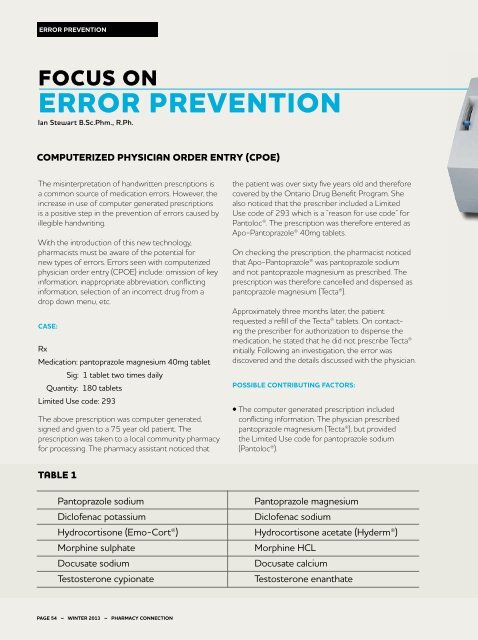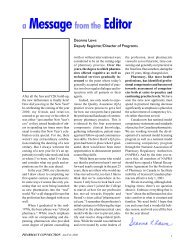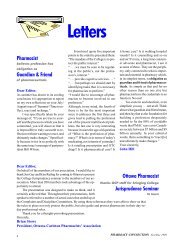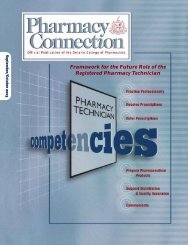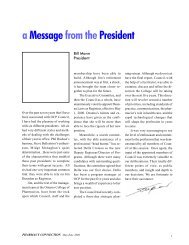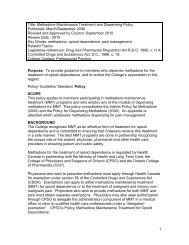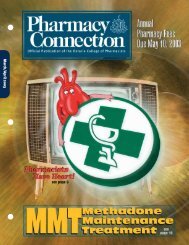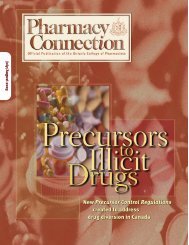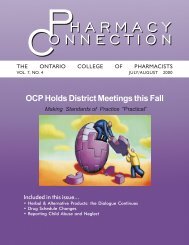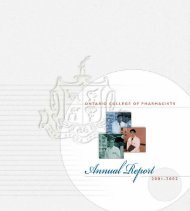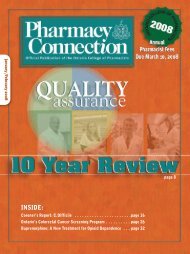Download - Ontario College of Pharmacists
Download - Ontario College of Pharmacists
Download - Ontario College of Pharmacists
You also want an ePaper? Increase the reach of your titles
YUMPU automatically turns print PDFs into web optimized ePapers that Google loves.
error prevention<br />
Focus on<br />
Error Prevention<br />
Ian Stewart B.Sc.Phm., R.Ph.<br />
computerized physician order entry (CPOE)<br />
The misinterpretation <strong>of</strong> handwritten prescriptions is<br />
a common source <strong>of</strong> medication errors. However, the<br />
increase in use <strong>of</strong> computer generated prescriptions<br />
is a positive step in the prevention <strong>of</strong> errors caused by<br />
illegible handwriting.<br />
With the introduction <strong>of</strong> this new technology,<br />
pharmacists must be aware <strong>of</strong> the potential for<br />
new types <strong>of</strong> errors. Errors seen with computerized<br />
physician order entry (CPOE) include: omission <strong>of</strong> key<br />
information, inappropriate abbreviation, conflicting<br />
information, selection <strong>of</strong> an incorrect drug from a<br />
drop down menu, etc.<br />
Case:<br />
Rx<br />
Medication: pantoprazole magnesium 40mg tablet<br />
Sig: 1 tablet two times daily<br />
Quantity: 180 tablets<br />
Limited Use code: 293<br />
The above prescription was computer generated,<br />
signed and given to a 75 year old patient. The<br />
prescription was taken to a local community pharmacy<br />
for processing. The pharmacy assistant noticed that<br />
the patient was over sixty five years old and therefore<br />
covered by the <strong>Ontario</strong> Drug Benefit Program. She<br />
also noticed that the prescriber included a Limited<br />
Use code <strong>of</strong> 293 which is a “reason for use code” for<br />
Pantoloc®. The prescription was therefore entered as<br />
Apo-Pantoprazole® 40mg tablets.<br />
On checking the prescription, the pharmacist noticed<br />
that Apo-Pantoprazole® was pantoprazole sodium<br />
and not pantoprazole magnesium as prescribed. The<br />
prescription was therefore cancelled and dispensed as<br />
pantoprazole magnesium (Tecta®).<br />
Approximately three months later, the patient<br />
requested a refill <strong>of</strong> the Tecta® tablets. On contacting<br />
the prescriber for authorization to dispense the<br />
medication, he stated that he did not prescribe Tecta®<br />
initially. Following an investigation, the error was<br />
discovered and the details discussed with the physician.<br />
Possible Contributing factors:<br />
• The computer generated prescription included<br />
conflicting information. The physician prescribed<br />
pantoprazole magnesium (Tecta®), but provided<br />
the Limited Use code for pantoprazole sodium<br />
(Pantoloc®).<br />
Table 1<br />
Pantoprazole sodium<br />
Dicl<strong>of</strong>enac potassium<br />
Hydrocortisone (Emo-Cort®)<br />
Morphine sulphate<br />
Docusate sodium<br />
Testosterone cypionate<br />
Pantoprazole magnesium<br />
Dicl<strong>of</strong>enac sodium<br />
Hydrocortisone acetate (Hyderm®)<br />
Morphine HCL<br />
Docusate calcium<br />
Testosterone enanthate<br />
PAGE 54 ~ WINTER 2013 ~ PHARMACY CONNECTION


